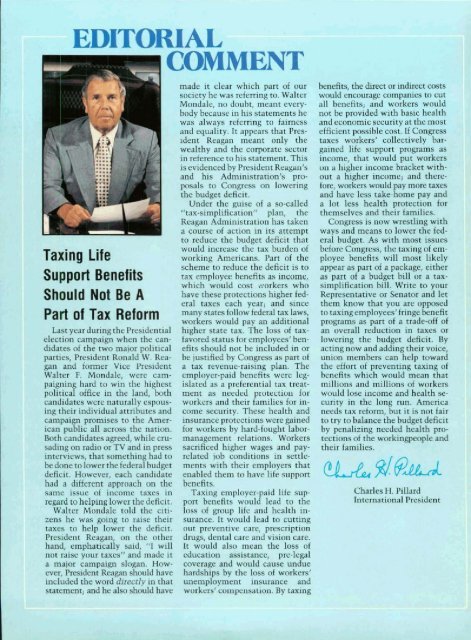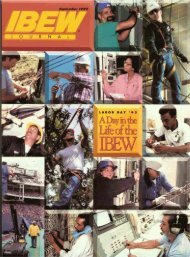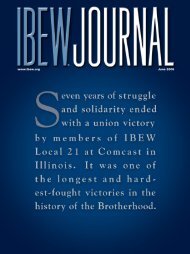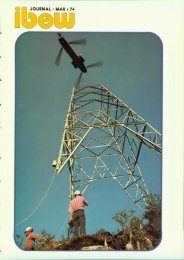1985-06 June IBEW Journal.pdf - International Brotherhood of ...
1985-06 June IBEW Journal.pdf - International Brotherhood of ...
1985-06 June IBEW Journal.pdf - International Brotherhood of ...
You also want an ePaper? Increase the reach of your titles
YUMPU automatically turns print PDFs into web optimized ePapers that Google loves.
EDITORIAL<br />
COMMENT<br />
Taxing Life<br />
Support Benefits<br />
Should Not Be A<br />
Pa rt <strong>of</strong> Tax Reform<br />
Last year during the Presidential<br />
election campaign when the candidates<br />
<strong>of</strong> the two major polincal<br />
parties, President Ronald W. Reagan<br />
and former Vice PresJdent<br />
Walter F. Mondale, were campaigning<br />
hard to win the hi ghest<br />
political <strong>of</strong>fice in the land, both<br />
candidates were naturally espousing<br />
their individual attributes and<br />
campaign promises to the American<br />
public all across the nation.<br />
Both candidates agreed, while rusading<br />
on radio or TV and in press<br />
interviews, that something had to<br />
be done to lowerthefederal budget<br />
deficit. However, each ca ndidate<br />
had a different approach on tbe<br />
Same issue <strong>of</strong> income taxes in<br />
regard to helping lower the defiCit.<br />
Walter Mondale told the citizenS<br />
he was going to raise their<br />
taxes to help lower the deficit.<br />
President Reagan, on the other<br />
hand, emphatically said, "] wlll<br />
not raise your taxes" and made it<br />
a major campaign slogan. However,<br />
President Reagan should have<br />
included the word direcLly in that<br />
statement; and he also should have<br />
made it clear which pan <strong>of</strong> our<br />
society he wa referring to. Wa ltcr<br />
Mondale, no doubt, meant every·<br />
body because in his statements he<br />
was alway referring to fairness<br />
and cquality. II appears that Presldent<br />
Reagan meant only the<br />
wealthy and the corporate sector<br />
in reference to his statement. This<br />
is evidenced by President Reagan's<br />
and his Admirusuation's proposals<br />
to Congress on lowering<br />
the budget deficit.<br />
Under the gUI e <strong>of</strong> a so-called<br />
"tax-simplification" pJan, the<br />
Reaga n Admilli tration has taken<br />
a course <strong>of</strong> action in its attempt<br />
to red uce the budget deficit that<br />
would increase the tax burden <strong>of</strong><br />
working Americans. Part <strong>of</strong> the<br />
scheme to reduce the deficit is to<br />
tax cmplnyce hcncfi ts as income,<br />
which would cost ,'lorkers who<br />
have these protections higher federal<br />
taxes each year; and since<br />
many Slates follow federal tax laws,<br />
workers would pay an additional<br />
higher state tax. The 10 s 01 taxfavored<br />
status for employees' benefi<br />
rs hould nOt be included in or<br />
be justified by ngress as pan <strong>of</strong><br />
a tax revenue-raising plan. The<br />
employer-paid benefits were legislated<br />
as a preferential tax treatmen<<br />
as needed prutectitJll for<br />
workers and their families for income<br />
security. These health and<br />
insurance protections were gained<br />
for workers by ha rd-Iougb t labormanagement<br />
relations. Worker<br />
sacrificed higher w3ges and payrelated<br />
job conditions in settlements<br />
with their employers that<br />
enabled them to have li fe SlippOrt<br />
benefits.<br />
Taxing employer-paid We sup<br />
POrt benefit would lead to the<br />
loss <strong>of</strong> group life and health insurance.<br />
It would lead to cutting<br />
out preventive ca re, prescription<br />
drugs, denial Care and vision carc.<br />
[t would also mean the loss <strong>of</strong><br />
education aSSistance, pre-legal<br />
coverage and would cause undue<br />
hardships by the loss <strong>of</strong> workers'<br />
unemployment insurance and<br />
wurkers' CUUlpeUSilllO.D. By l axing<br />
benefits, the direct or indirect COSts<br />
would encourage companies to cut<br />
all benefits; and workers would<br />
not be provided wlth baslc health<br />
and economic security at the mOSt<br />
efficient possible cost. 1.£ Congress<br />
taxes workers' collectively bargai<br />
ned life support programs as<br />
income, that would put wo rkers<br />
un a higilci income bracket Without<br />
a hJgher income; and therefore,<br />
workers would pay morc ta.~es<br />
and havc les take home pay and<br />
a lot less health protection fo r<br />
themselves and thei.r families.<br />
ongress is now wre tling wi th<br />
ways and means to lower the fed <br />
era l budget. As with rna tissues<br />
before Congress, the toxi ng <strong>of</strong> employee<br />
benefits will most likely<br />
appear as part <strong>of</strong> a package, either<br />
as part <strong>of</strong> a budget bill or a tax<br />
Simplification bH I. Write to your<br />
Representative or Se nator and let<br />
them know that you are opposed<br />
to taxing employees' fringe benefit<br />
programs as part <strong>of</strong> a. trade-<strong>of</strong>f 01<br />
an overall reduction in taxes or<br />
lowering the budget defi ci t. By<br />
acting now and adding their voice,<br />
union membcrs can help t ward<br />
the effort <strong>of</strong> preven ting taxing <strong>of</strong><br />
benefits which would mean that<br />
mill ions and millions 01 workers<br />
would lose income and health security<br />
in the long n lll. America<br />
needs tax reform, but it is not fair<br />
to try to balance the budget deficit<br />
by penalizing needed bcalth pTOtections<br />
<strong>of</strong> the workingpcoplc and<br />
thClf fami He .<br />
Charles H. Pillard<br />
<strong>International</strong> President
















